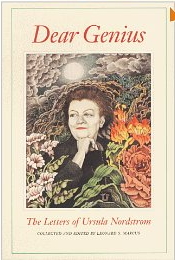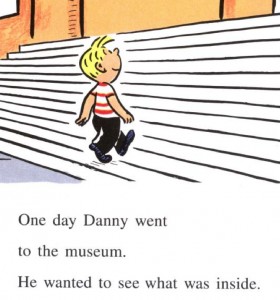Dear Genius
 A book of letters I ought to have included in my ode to epistles and epistolaries the other day: Dear Genius: The Letters of Ursula Nordstrom. Miss Nordstrom, the pioneering editor behind Harper’s Department of Books for Boys and Girls from 1940 to 1973, was something of a genius herself. The list of children’s classics she was responsible for publishing is staggeringly long and awesome: Little Bear, Where the Wild Things Are, Goodnight Moon, Danny and the Dinosaur, Where the Sidewalk ends, Harold and the Purple Crayon, oh and a little thing called Charlotte’s Web—to name a very few.
A book of letters I ought to have included in my ode to epistles and epistolaries the other day: Dear Genius: The Letters of Ursula Nordstrom. Miss Nordstrom, the pioneering editor behind Harper’s Department of Books for Boys and Girls from 1940 to 1973, was something of a genius herself. The list of children’s classics she was responsible for publishing is staggeringly long and awesome: Little Bear, Where the Wild Things Are, Goodnight Moon, Danny and the Dinosaur, Where the Sidewalk ends, Harold and the Purple Crayon, oh and a little thing called Charlotte’s Web—to name a very few.
Dear Genius is a collection of letters she wrote to authors, illustrators, reviewers, even parents and children who had written with responses to her books. She is unfailingly poised, charming, and insightful, even when responding to criticism. And her voice, oh her wonderful voice! Her letters are simply crammed with personality—she is wry, teasing, incisive, direct, and altogether brilliant.
Her editorial letters provide a fascinating look at the history of children’s publishing in America, both on the grand scale of publishing trends and literary vision, and on the micro scale of word choices for a single line of a specific book. For instance, in a 1957 letter to Syd Hoff about Danny and the Dinosaur, an early “I Can Read” book for beginning readers:
I think you should just say “One day Danny went to the museum.” (He didn’t actually want to “see how the world looked a long, long time ago,” as you put it, do you think? Very unchildlike. He might have wanted to go to see the dead mummies, or other specific things in a museum, but I wouldn’t mention that here because you mention it on following pages. So just have a simple statement on this first page. “One day Danny went to the museum.”) It is pretty short and if you can think of one more short sentence for this page by all means add it. I can’t come up with any suggestion myself. Page 8: You’ll have to simplify what he saw on this page. NOT THAT I WANT YOU TO GET SELF-CONSCIOUS ABOUT “I CAN READ.” I told you I wanted you to let me worry about that aspect and that’s all I’m doing now. You could just say “He saw Indians. He saw bears. He saw…” I haven’t been in a museum in 150 years and can’t think of anything else, but you can.
Or, in September 1963:
Maurice, before I sent the paste-up I went through it, rereading the words, and looking at the pictures again. It is MOST MAGNIFICENT, and we’re so proud to have it on our list. When you were much younger, and had done only a couple of books, I remember I used to write you letters when the books were finished, and thank you for “another beautiful” job—or some such dopiness. Now you’re rich and famous and need no words of wonder from me. But I must send them, anyhow, when I look through Where the Wild Things Are. I think it is utterly magnificent, and the words are beautiful and meaningful, and it does just want you wanted it to do. And you did just what you wanted to do.
Or, from a reply to a reader of Little House on the Prairie in 1952:
Your letter to Mrs. Wilder…came several weeks ago. We took the liberty of opening it as we do many of the letters that are addressed to Mrs. Wilder…[she] is now in her late eighties and we try to handle much of her correspondence here.
We were indeed disturbed by your letter. We knew that Mrs. Wilder had not meant to imply that Indians were not people and we did not want to distress her if we could possibly avoid it. I must admit to you that no one here realized that those words read as they did. Reading them now it seems unbelievable to me that you are the only person who has picked them up and written to us about them in the twenty years since the book was published. We were particularly disturbed because all of us here feel just as strongly as you apparently feel about such subjects, and we are proud that many of the books on the Harper list prove that. Perhaps it is a hopeful sign that though such a statement could have passed unquestioned twenty years ago it would never have appeared in anything published in recent years.
Instead of forwarding your letter to Mrs. Wilder I wrote her about the passage and said that in reprinting we hoped that she would allow us to change it. I have just received her answer. She says: “You are perfectly right about the fault in Little House on the Prairie and have my permission to make the correction you suggest. It was a stupid blunder of mine. Of course Indians are people and I did not mean to imply they were not.” We are changing the next printing to read “There were no settlers.”
Fascinating. I could quote from this book all day but you’re much better off scrounging up a copy yourself.
books about books, children's literature, dear genius, Laura Ingalls Wilder, Maurice Sendak, Syd Hoff, ursula nordstrom

Mary G says:
As always, you recommend such cool books …. AND this one happens to be in the Fredericksburg library so I’ll be able to check it out!
This sounds like it should be required reading for would-be children’s authors!
On June 25, 2011 at 1:21 am
mamacrow says:
oh my word. I HAVE TO READ THIS BOOK!
On June 25, 2011 at 2:19 am
Mary-Alice says:
I re-read sections of this book all the time; it’s also a great book for young editors just learning the craft. And that Danny & the Dino letter perhaps most of all; it’s masterful.
On June 25, 2011 at 4:23 am
Becky says:
Lissa, since you’re opening it up to include nonfiction, real-life letters, I have to suggest, in addition to the above, “Letters of EB White”, which are charming and a lovely, usually very funny, window into Andy White’s personal and professional lives.
And speaking of EB White and letters, his NYer editor wife Katharine’s letters with Elizabeth Lawrence are perfect summer reading for any gardener, or even would-be gardener — “Two Gardeners: Katharine S. White and Elizabeth Lawrence, A Friendship in Letters”.
And funniest of all, “The Groucho Letters”. Masterful.
An online selection — not ongoing correspondences, though, just individual letters (moving, funny, crazy, inspiring, you name it):
the blog Letters of Note, http://www.lettersofnote.com
letters to the children of Troy, Michigan, on the opening of the city’s new library building in 1971, from a number of celebrated authors (including EB White and Spiro Agnew — now *there’s* a pair!),
http://troylibrary.info/letterstothechildrenoftroy
On June 25, 2011 at 8:52 am
melissa wiley says:
Oh!!! I LOVE Elizabeth Lawrence! Besides Katherine White she is my favorite gardening writer. Esp Gardening for Love. I didn’t know there were letters. Thank you!
On June 25, 2011 at 8:58 am
yvonne says:
I second the E.B. White letters and the Elizabeth Lawrence/Katherine White letters–both are fabulous.
On June 25, 2011 at 10:15 am
Carol says:
I, too, throughly enjoyed reading “Dear Genius” and learning more about Urusala Nordstrom’s gift as mentor and editor.If you’d like to learn more about children’s author Syd Hoff, visit http://www.SydHoff.org. I created the site, to honor the legacy of my late uncle.
On June 27, 2011 at 8:28 am
Melissa Wiley says:
Carol, I’m delighted to learn about your site! Can’t wait to visit. Your uncle!! You must have some wonderful stories!
On June 27, 2011 at 10:02 am
MFS says:
Dear Genius arrived today — thanks to this entry. Opened randomly, it fell on a letter from Nordstrom to White. Talk about serendipity, synthesis, and synchronicity, eh?
On June 28, 2011 at 9:36 am
Amy @ Hope Is the Word says:
Having recently finished The Story of Charlotte’s Web (in which Nordstrom plays no small part), I must read this book’
On June 28, 2011 at 10:19 am
Jeanne says:
Oh my goodness. How amazing to hear these letters to writers. My breath caught in my throat!
New library in our new (old) locale (back to Charlottesville area) – will have to see if I can find this book!
On June 29, 2011 at 2:59 am
Melissa Wiley says:
MFS—serendipity indeed, especially in conjunction to my reread of 84 Charing Cross Road with its many rhapsodies about the joys of pre-owned books which fall open to enticing passages!
On June 29, 2011 at 9:23 am
Gina Ruiz says:
Ooh this does sound wonderful! I want it! Another great post.
It also remind me of another epistolary book that I absolutely adored. Love, Julia – the letters of one of my idols, Julia Child. It’s an amazing insight to a brilliant, progressive, warm and very forward thinking woman. Just fabulous.
On July 20, 2011 at 6:28 pm